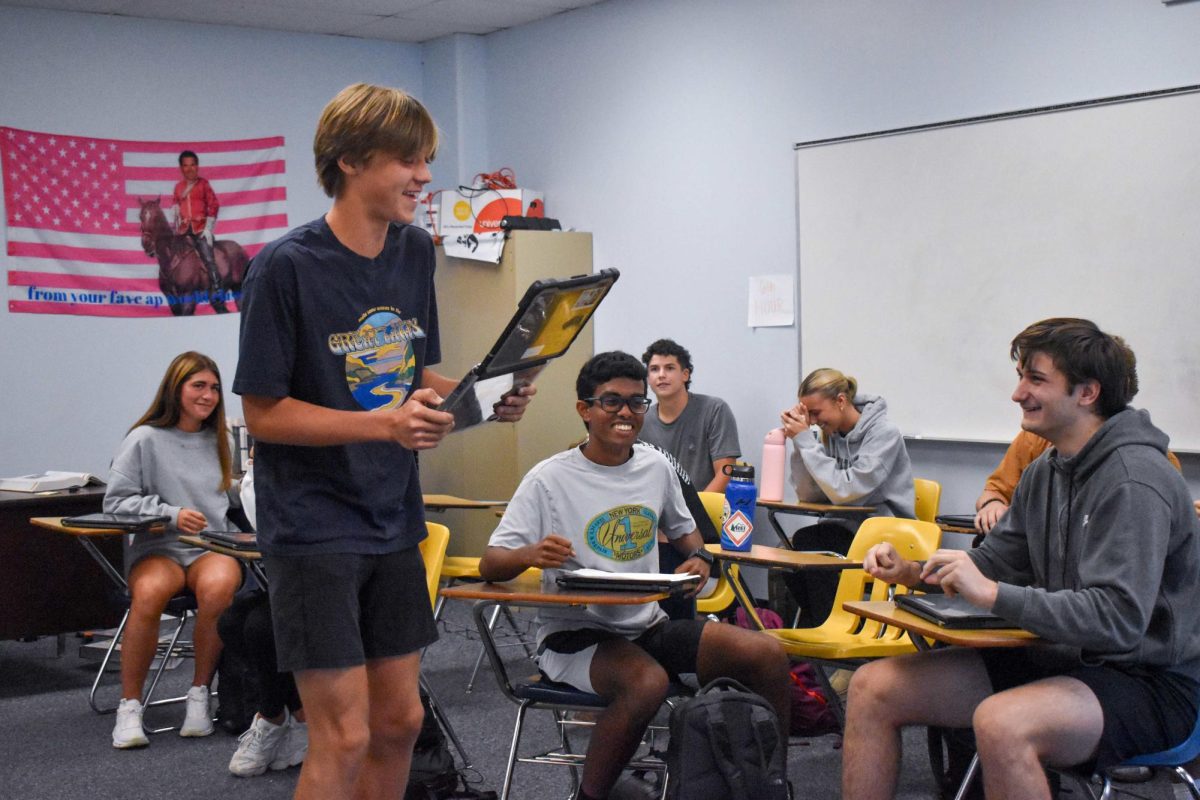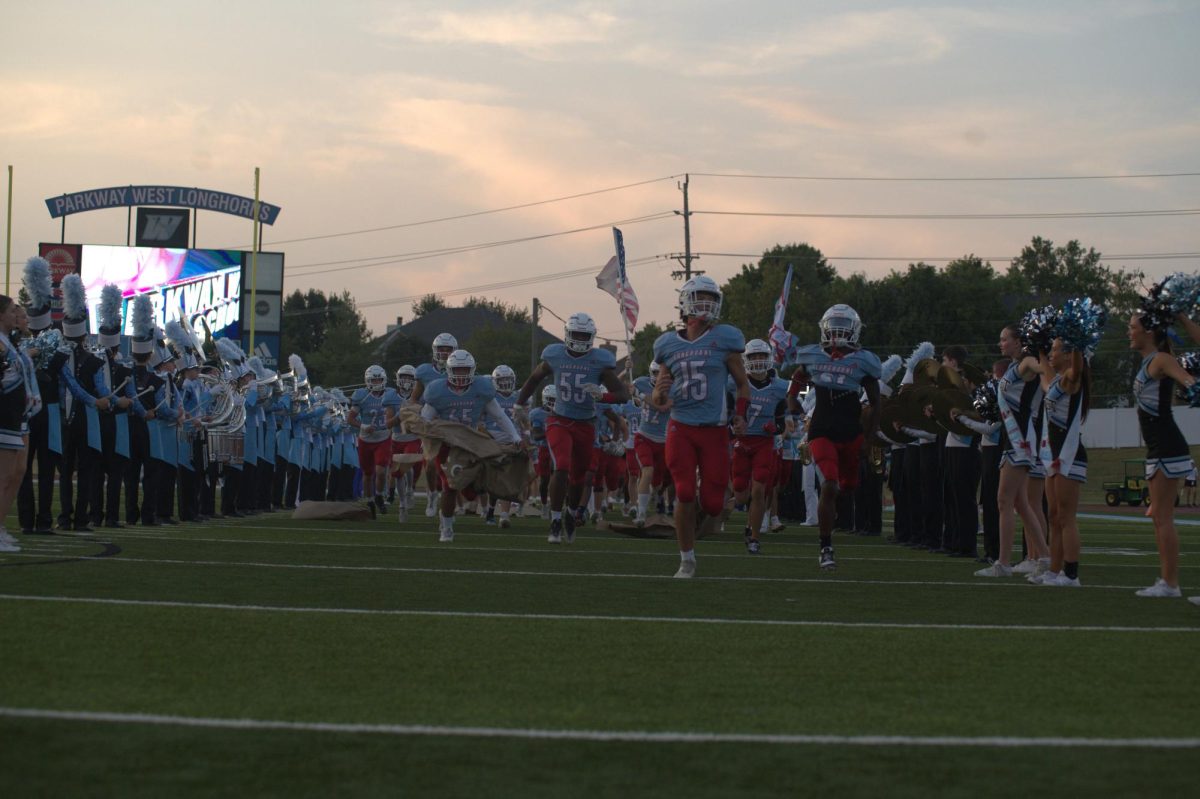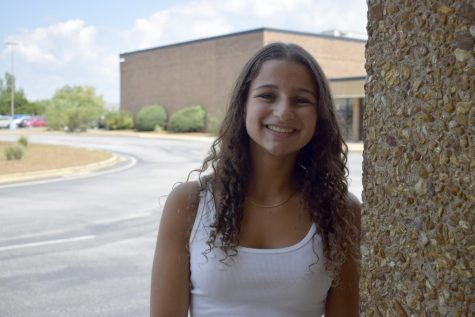Bones ache from sleeping on the hard street, stomachs growl from lack of food and cars honk as they pass by the six and 8-year-old Sayle —now Araya — siblings. Cold days turn into even colder nights, and uncalled-for independence from the absence of adults in their lives is a constant.
Due to her biological mother’s substance abuse and her father’s absence, junior Shaleigh Araya spent her childhood bouncing between living with her mother’s friends, group homes, and foster families. She even spent a brief period living on the streets with her brother.
“There was a lot of darkness in my life before I was adopted,” Araya said. “[My life] was normal for me at the time, but looking back, I can tell that’s not what a family environment is supposed to be. I had never even seen a Christmas tree until [I was 11-years-old].”
At six, Araya’s biological mom left her and her brother, LeBron, now 19, entirely by themselves. The only consistent assistance that they received was from the Salvation Army.
“[My brother LeBron] and I were on the streets for a while. My brother just took care of me,” Araya said. “[LeBron] would go find our meals, and my mother was just in and out. I don’t remember it well because I was young, but it was pretty bad.”
Araya and her brother eventually found shelter in her mother’s friend’s home, but the situation was still not optimal. The siblings were in a vulnerable position with no genuine assistance or parental figures, and their circumstances led Lebron to suffer abuse and Araya to suffer emotional abuse.
“[For a while] I bounced back and forth between my biological mom’s friends. It wasn’t [ideal], but it was fine,” Araya said. “Being a young female helped because I never got physically abused, but I suffered emotional abuse that has carried over even to this day.”
At seven, Araya and LeBron were dropped off at a temporary shelter called Children’s Haven, a shelter for children experiencing a “family crisis.” The shelter provided housing, food and transportation to school, among other things, for the Araya children.
“[LeBron and] I were dropped off at a group home called Children’s Haven by my biological mom. You could just drop off your kids there, and they would take care of them,” Araya said. “I only [had] a trash bag with some clothes [with me].”
Araya’s physical education teacher found out about her and her brother’s living situation at Children’s Haven in 2012 and ended up fostering the siblings. After their teacher had fostered them, they were placed with a different family, the Arayas, and adopted Jan. 19, 2016. Araya attributes much of her success to her family and faith.
“My family [the Arayas] and the space that they created is a very safe space,” Araya said. “[My parents] are super supportive, and they’re constantly pushing me to do better things.”
While Araya believes that she cannot simply “move past” her background, she accepts her trauma as a part of her life and takes measures, like years of therapy, to become successful.
“I have seen the mistakes that my biological family has made, and I just try to avoid them because I don’t want to end up like them,” Araya said. “I think something super important that I’ve learned is that your past does not have to define or shape you. Remember to keep pushing forward and not [get stuck] in the past. [Instead], look forward to the things that you can become.”


![Junior Shaleigh Araya (front row, far left) poses with her adoptive family for a picture in 2019. Araya said she owes her success to her family and faith. “God has really helped me in life,” Araya said. “That’s the number one thing I [attribute] to my success. Next comes [the support] of my family and friends.”](https://pwestpathfinder.com/wp-content/uploads/2022/02/IMG-1923.jpg)

![Freshman Daphne Stokes looks at a table with Veterans Day flyers and information on Nov. 11. Stokes, along with other West High students, like senior Alexander Lewinski, passed by the table in the cafeteria with army recruitment information and giveaways for students to observe during lunch. “Talking with [the recruiters] has definitely helped me [find] where I wanted to go, more than anything else,” Lewinski said.](https://pwestpathfinder.com/wp-content/uploads/2025/11/DSC_1227-2-1200x800.jpg)
![Helping a customer, print room assistant Gretchen Williams operates her booth at the West High Craft Fair from Oct. 25-26. This was Williams’ first time participating in the Craft Fair with her new craft shop, Gs Beaded Boutique. “People have always said, over the years, ‘you should open something.’ [I replied that] I would rather just make [my crafts as] gifts for people. I just started [the online store] up, and it's been okay. I'm always surprised [by] how many views I get and [the] people from different states buying things; somebody from Alaska bought something the other day.”](https://pwestpathfinder.com/wp-content/uploads/2025/11/DSC0451-2-1200x799.jpg)
![Gesturing toward the club’s name on the board, Global Youth Aid co-president year Daniah Alsagheer discusses upcoming service projects with members during a meeting on Oct. 30. “We might be one club at one school, but together, we’re [part of] something much bigger,” Alsagheer said.](https://pwestpathfinder.com/wp-content/uploads/2025/11/DSC00949-1200x800.jpg)
![Focused on providing exceptional service, sophomore Darsh Mahapatra carefully cleans the door of a customer’s car. Mahapatra has always believed his customers deserve nothing less than the best. “[If] they’re trusting us with their car and our service, then I am convinced that they deserve our 100 percent effort and beyond,” Mahapatra said.](https://pwestpathfinder.com/wp-content/uploads/2025/10/DSC_0018-1200x800.jpg)
![Sophomore Aleix Pi de Cabanyes Navarro (left) finishes up a soccer game while junior Ava Muench (right) warms up for cross country practice. The two came to Parkway West High School as exchange students for the 2025-2026 school year. “The goal for the [exchange] program is to provide opportunities for both Parkway students and our international exchange students to learn about other cultures, build connections and become confident, capable, curious and caring — Parkway’s Four C’s — in the process,” Exchange Program Lead Lauren Farrelly said.](https://pwestpathfinder.com/wp-content/uploads/2025/10/Feature-Photo-1200x800.png)

![Gazing across the stage, sophomore Alexis Monteleone performs in the school theater. The Monteleone family’s band “Monte and the Machine” has been releasing music since 2012, but Alexis started her own solo career in 2024 with the release of her first single, Crying Skies. “My whole family is very musical, [and I especially] love writing [songs with them],” Monteleone said.](https://pwestpathfinder.com/wp-content/uploads/2025/09/DSC7463-1200x798.jpg)
![Amid teaching a lesson to her AP Calculus BC class, Kristin Judd jokes alongside her students in their funny remarks. Judd has always enjoyed keeping the mood light in her classroom, along with on the volleyball court. “[I enjoy] that side talk where you see [or] overhear a conversation and chime in, or somebody says something funny,” Judd said.](https://pwestpathfinder.com/wp-content/uploads/2025/09/image-1200x730.jpg)
![Eyeing the ball, junior Ella McNeal poses for her commitment pictures at Clemson University. McNeal’s commitment comes after months of contact with top Division 1 soccer programs. “ It has taken a lot to get to where I am, but I know that [what] I've already been through is just the beginning, and I can't wait for what is to come,” McNeal said.](https://pwestpathfinder.com/wp-content/uploads/2025/09/IMG_4926-1200x900.jpeg)

![Sophomore Shree Sikkal Kumar serves the ball across the court in a match against Lindbergh. Sikkal Kumar has been a varsity member of the varsity girls’ tennis team for two years, helping her earn the number two rank in Class 2 District 2.“When matches are close, it’s easy to get nervous, but I [ground] myself by[staying] confident and ready to play,” Sikkal Kumar said.](https://pwestpathfinder.com/wp-content/uploads/2025/11/DSC2801-1200x798.jpg)
![Dressed up as the varsity girls’ tennis coach Katelyn Arenos, senior Kate Johnson and junior Mireya David hand out candy at West High’s annual trunk or treat event. This year, the trunk or treat was moved inside as a result of adverse weather. “As a senior, I care less about Halloween now. Teachers will bring their kids and families [to West’s Trunk or Treat], but there were fewer [this year] because they just thought it was canceled [due to the] rain. [With] Halloween, I think you care less the older you get,” Johnson said.](https://pwestpathfinder.com/wp-content/uploads/2025/10/DSC00892-1-1200x800.jpg)
![Leaning on the podium, superintendent Melissa Schneider speaks to Parkway journalism students during a press conference. Schneider joined Parkway in July after working in the Thompson School District in Colorado. “My plan [to bond with students] is to get things on my calendar as much as possible. For example, being in [classes] is very special to me. I am trying to be opportunistic [meeting] kids [and] being in [the school] buildings. I have all the sports schedules and the fine arts schedules on my calendar, so that when I'm available, I can get to them,” Schneider said.](https://pwestpathfinder.com/wp-content/uploads/2025/09/IMG_5425-1200x943.jpeg)

![Leaping through the air, senior Tyler Watts celebrates his first goal of the season, which put the Longhorns up 1-0 against the Lafayette Lancers. Watts decided to play soccer for West for his last year of high school and secured a spot on the varsity roster. “[Playing soccer for West] is something I had always dreamed of, but hadn’t really had a good opportunity to do until now. It’s [really] fun being out [on the field], and I’m glad I decided to join the team. It’s just all about having fun with the boys and enjoying what time we have left together,” Watts said.](https://pwestpathfinder.com/wp-content/uploads/2025/09/DSC_1951-1200x855.jpg)

![Shifting global trade, President Donald Trump’s tariffs are raising concerns about economic stability for the U.S. and other countries alike. “[The tariffs are] going to pose a distinct challenge to the U.S. economy and a challenge to the global economy on the whole because it's going to greatly upset who trades with who and where resources and products are going to come from,” social studies teacher Melvin Trotier said.](https://pwestpathfinder.com/wp-content/uploads/2025/05/MDB_3456-1200x800.jpg)

![Pitching the ball on Apr. 14, senior Henry Wild and his team play against Belleville East. Wild was named scholar athlete of the year by St. Louis Post-Dispatch after maintaining a high cumulative GPA and staying involved with athletics for all of high school. “It’s an amazing honor. I feel very blessed to have the opportunity to represent my school [and] what [it] stands for,” Wild said.](https://pwestpathfinder.com/wp-content/uploads/2025/05/unnamed-6-1200x714.jpg)

Emily • Feb 15, 2022 at 12:26 pm
Such a well-written story, Katie. I’m glad you were able to share Shaleigh’s story.